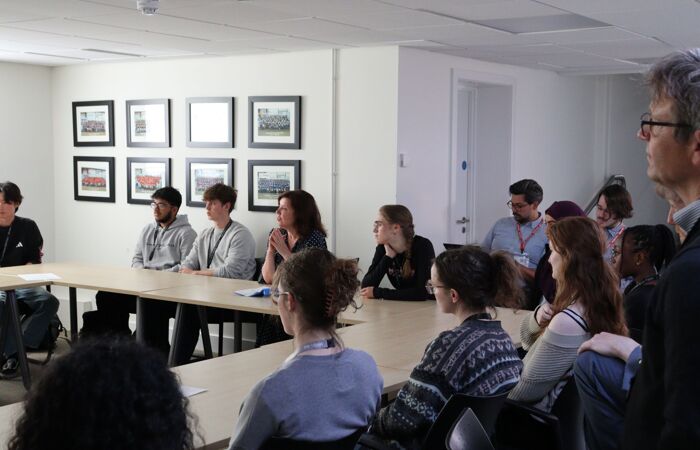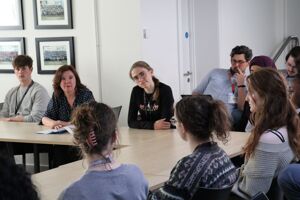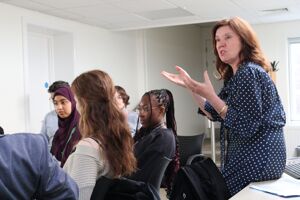Children’s Commissioner Chairs Maths Roundtable at Sir Isaac Newton Sixth Form
Back
On Thursday 8th June, Dame Rachel de Souza - Children’s Commissioner for England, visited Sir Isaac Newton Sixth Form in Norwich to chair a maths roundtable focussed on hearing from students regarding the new government policy “Maths to 18”. This is in response to recent news of plans that all children should continue to study some form of maths up to the age of 18.
As a specialist maths and science college, Sir Isaac Newton Sixth Form was the ideal destination for this discussion to take place. Students from both Years 12 and 13 from one of the UK’s top A-Level providers and partner sixth form Jane Austen Sixth Form College attended the roundtable to communicate their opinions with the Children’s Commissioner.
Additional leaders from the education sector also attended including Dr Vanessa Ogden, CEO of the Mulberry Schools Trust, Shahina Ahmad OBE, Regional Director and Executive Principal at Star Academies and Chris Jennings, Principal at Sir Isaac Newton Sixth Form.
This group of students discussed how their studies were progressing and their hopes for the future, as well as their opinions on plans for all children to study maths up to the age of 18. Students voiced a range of opinions with questions chaired by the Children’s Commissioner, Dame Rachel de Souza along with Principal, Chris Jennings and Rachel Jarrold, Vice Principal at Sir Isaac Newton Sixth Form.
Some students were concerned about how additional maths, on top of a rigorous A-Level workload, could negatively affect their studies.
Faith, a Year 12 student said:
“[Maths to 18 is] something that could be taken into consideration but there are other factors beforehand that need to be looked into further.”
Other students felt that it was a good idea if implemented with a “life skills” approach that promoted a deeper understanding of personal economics, covering things such as mortgages and compound interest. They felt this approach would benefit them in the future, providing practical skills that aren’t directly focused on maths in its traditional sense.
Ryu, a Year 12 student said:
“I would say some sort of maths until 18 is vital. Maths isn’t just about knowing how to do stuff with numbers, it's also about critical analysis, and the development of neuroplasticity of your brain which is transferable to how you perform in a degree, your jobs and even your other A-Levels.”
It was clear through discussing the different experiences of the students and leaders at the roundtable that there was interest in rethinking the curriculum from a primary school level, and that it was important to cultivate an interest and mastery in maths from a young age rather than prolonging maths into A-Levels, T-Levels or apprenticeships.
For students that chose not to study maths at A-Level, some felt that maths was no longer relevant to their career or aspirations, whilst others intentionally chose maths to support their A-Levels and found it useful to reinforce their knowledge in other subjects.
Harley, a Year 12 student said:
“It could be a good idea if it's done right, it could teach people good skills everyone can know and use. However, there needs to be a better infrastructure in place from early years, in primary and in high school to make sure everyone is fully engaged, included and everyone wants to learn.”
Dame Rachel de Souza, Children’s Commissioner for England said:
"It was a pleasure to visit Sir Issac Newton Sixth Form, and to gather pupils' views on maths to 18. It was a really engaging discussion and so valuable to hear young people's thoughts on what they think this should look like, what the expectations should be within different courses, and how we can support young people to overcome barriers to specific groups.
"Since The Big Ask, I have made it my priority to support children, especially young girls, to pursue a love of STEM and maths subjects – which is why I welcome the Prime Minister's ambition. I look forward to reflecting the views of children and young people in my recommendations to Government."
The students' contributions and themes of discussion gathered from this roundtable will be taken into consideration by the Children’s Commissioner and evidenced as part of the ongoing plans for Maths to 18, in order to ensure that the needs of students are put at the forefront of the discussion.



